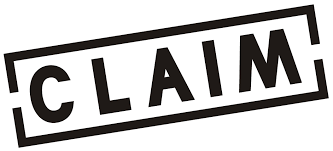claim
英 [kleɪm]
美 [kleɪm]
- vi. 提出要求
- vt. 要求;声称;需要;认领
- n. 要求;声称;索赔;断言;值得
星级词汇:

记忆方法
为了记忆单词“claim”,可以将其拆解为“cle”和“aim”。记忆方法是想象自己有一个清晰的“aim”(目标)去“claim”(声称、主张)某事物,就像在比赛中获得胜利后清晰地宣称自己的权利或成就一样。这种方法通过将单词的组成部分与一个具体的情景联系起来,有助于记忆。
以上内容由AI生成, 仅供参考和借鉴
中文词源
claim 声称
来自PIE*kele,叫,呼喊,词源同call,clamor.
英语词源
- claim
-
claim: [13] The etymological notion behind claim is of ‘calling out’. It comes from claim-, the present stem of Old French clamer, which goes back to Latin clāmāre ‘cry out, shout’ (whose derived noun clāmor is the source of English clamour [14]). Relatives of clāmāre include clārus (source of English clear) and possibly callāre ‘call out’ (whence English council); and it formed the basis of the English verbs acclaim, exclaim, and proclaim (their spelling was altered through association with claim).
These words’ ultimate source was the onomatopoeic Indo- European base *klā-, which also produced low ‘make the noise characteristic of cattle’.
=> acclaim, clamour, clear, council, exclaim, low, proclaim - claim (v.)
- c. 1300, "to call, call out; to ask or demand by virtue of right or authority," from accented stem of Old French clamer "to call, name, describe; claim; complain; declare," from Latin clamare "to cry out, shout, proclaim," from PIE *kele- (2) "to shout," imitative (compare Sanskrit usakala "cock," literally "dawn-calling;" Latin calare "to announce solemnly, call out;" Middle Irish cailech "cock;" Greek kalein "to call," kelados "noise," kledon "report, fame;" Old High German halan "to call;" Old English hlowan "to low, make a noise like a cow;" Lithuanian kalba "language"). Related: Claimed; claiming.
Meaning "to maintain as true" is from 1864; specific sense "to make a claim" (on an insurance company) is from 1897. Claim properly should not stray too far from its true meaning of "to demand recognition of a right." - claim (n.)
- early 14c., "a demand of a right; right of claiming," from Old French claime "claim, complaint," from clamer (see claim (v.)). Meaning "thing claimed or demanded" is from 1792; specifically "piece of land allotted and taken" (chiefly U.S. and Australia, in reference to mining) is from 1851. Insurance sense is from 1878.
权威例句
- 1. Jane is determined to stake her claim as an actress.
- 简决心主张自己作为一名女演员的权利。
- 2. You must claim your prize by telephoning our claims line.
- 您必须通过拨打我们的领奖电话来领取奖品。
- 3. Television censors are cutting out scenes which they claim may offend.
- 电视节目审查官正在剪掉他们称有可能会令人反感的一些镜头。
- 4. Millions of householders are eligible to claim the new council tax benefit.
- 数百万房主都有资格申请新的市政税优惠。
- 5. Coleman has never wavered in his claim that he is innocent.
- 科尔曼坚称他是无辜的。